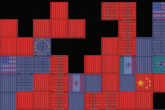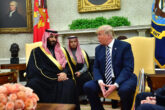
June 03, 2020
Virtual Roundtable: How is covid-19 changing European economic sovereignty?
What does the corona crisis mean for economic coercion? How does it amplify some of the problems stemming from punitive economic measures Europeans have worried about? Especially in the context of increasing tensions between the U.S. and China, of maximum pressure strategies, and of the depth of the economic crisis we are facing globally. Finally, how might the structural changes in our economies – from the increased role of the state to value chain reviews – change the nature of economic coercion? Who might benefit and what does it mean for European governments and companies? Elizabeth Rosenberg joins Erica Moret and Jonathan Hackenbroich to discuss.
Listen to the full conversation on The European Council on Foreign Relations.
More from CNAS
-
Game Over?
The trade wargame suggests that sustained high tariffs could create leverage and urgency to spur action toward a productive restructuring of the international trade system....
By Emily Kilcrease & Geoffrey Gertz
-
Middle East Security / Energy, Economics & Security
Trump Inks $600 Bn Deal In Saudi Arabia | Musk, Blackrock CEO Flank Trump In Gulf VisitIn today's episode of India Global, U.S. President Donald Trump secured a $600 billion commitment from Saudi Arabia on Tuesday to invest in the United States. NDTV's Gaurie Dw...
By Daniel Silverberg
-
Energy, Economics & Security / Technology & National Security
Tariffs and Tech: An Uncertain RecipeHigher tariffs could prompt American cloud companies to shift more of their capital investments abroad....
By Pablo Chavez
-
Trump Tariffs: How Will U.S. Plans Reshape the Global Economy?
Donald Trump says he's already decided the tariffs he will impose on countries that export goods to America, including the United Kingdom. Channel 4 hears from Emily Kilcrease...
By Emily Kilcrease




